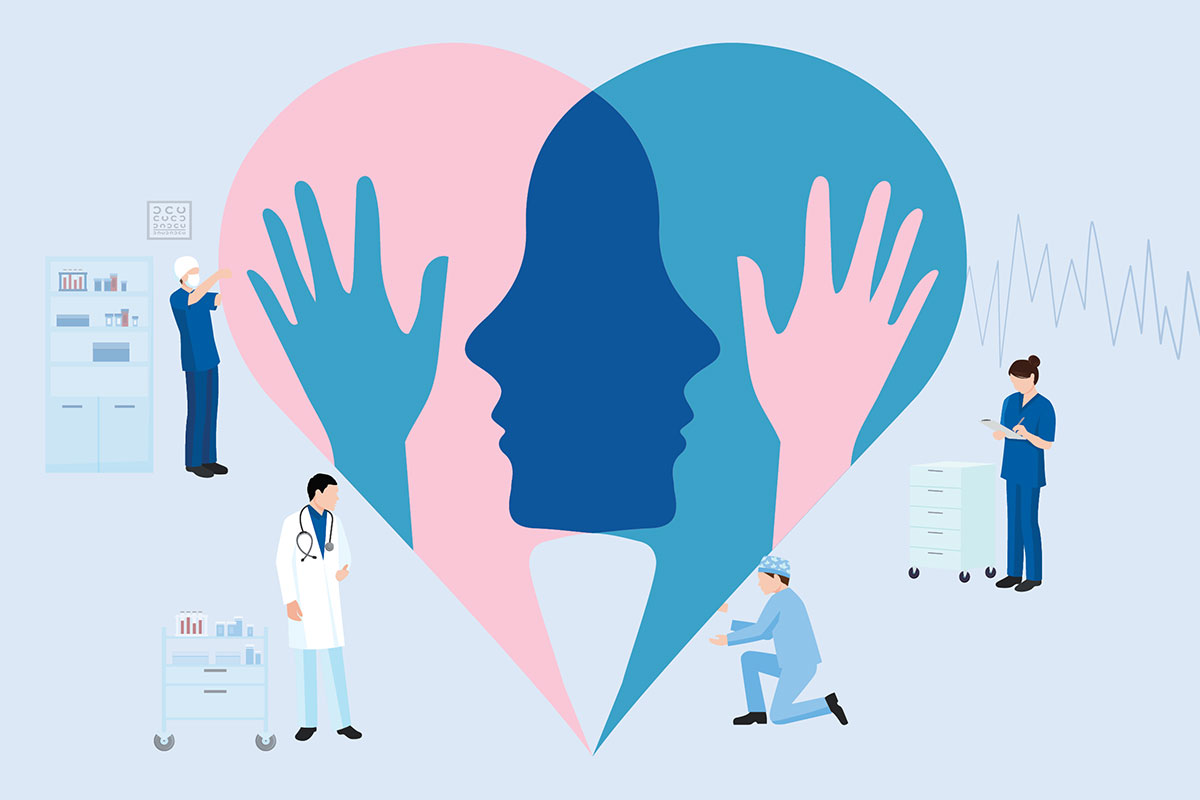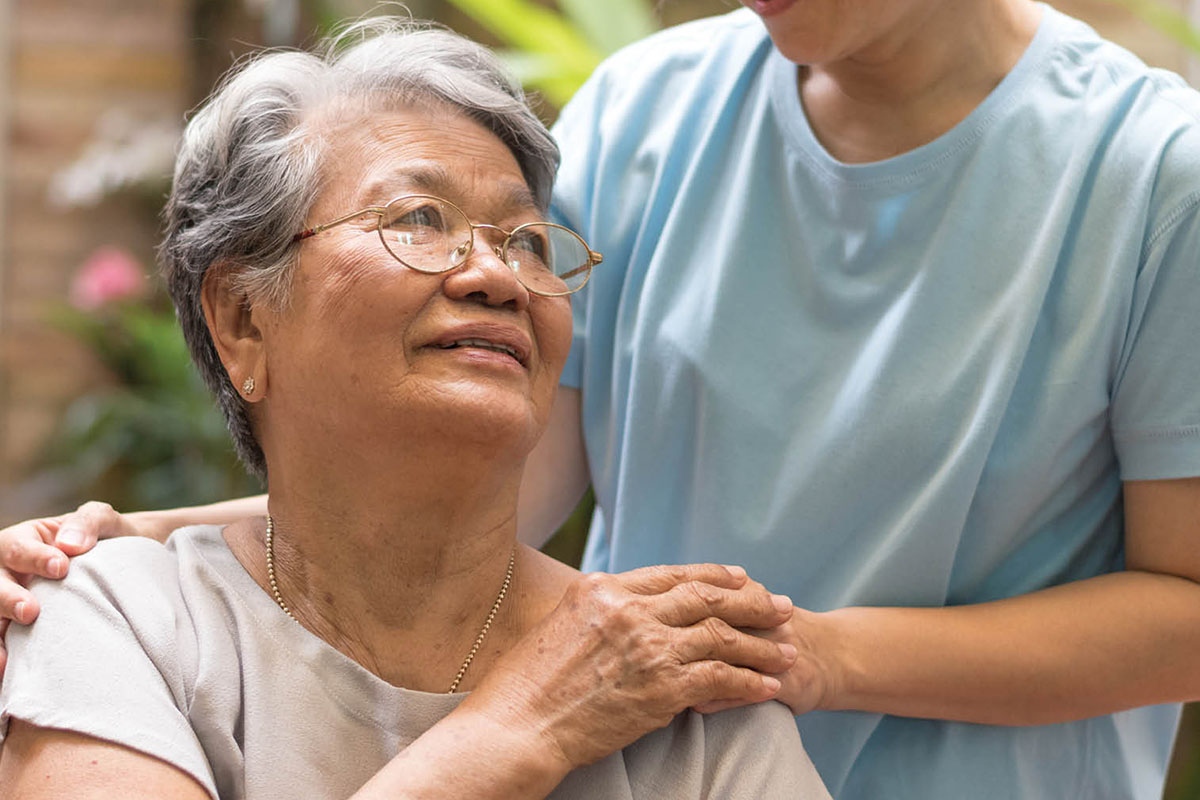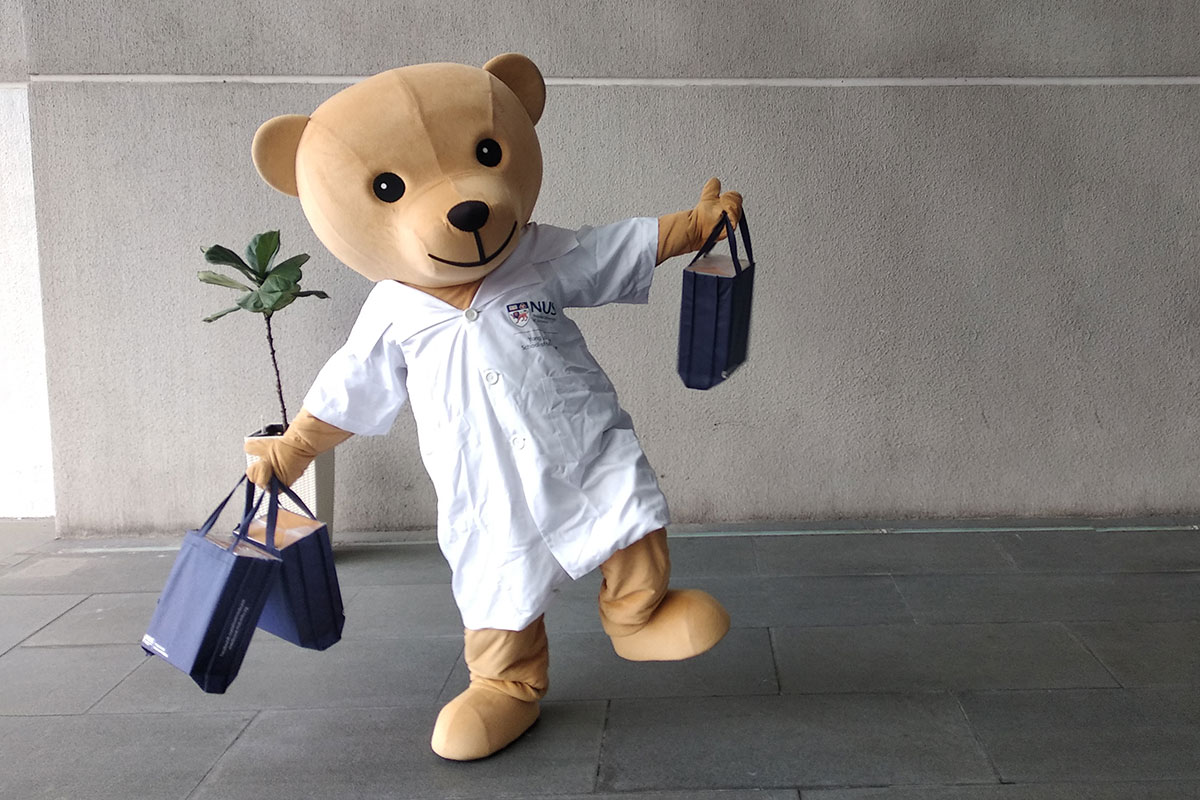
Issue 40 / November 2021
Nursing
How Do You Care?
Sympathy and Empathy in Healthcare

“I have no time to talk to you.” That was what I heard a healthcare provider tell a patient’s relative, as they hurriedly moved on to the next patient during rounds.
s a Nursing student, that was not new to me; I have had enough hospital postings to write a novel on that kind of behaviour. I learnt to quickly “accept” and adapt to each colleague’s working style—especially that of senior doctors (mild hasty generalisation noted).
They could just be having a bad day, I thought, attributing their seemingly rude demeanour to stress, fatigue, or simply the sheer number of patients to see. But one would expect a little more sympathy (I will not even ask for empathy at this point) towards Mrs Tan1, a patient who came in for migraines, only to discover that she had metastatic liver cancer.
Sympathy and empathy are qualities often misunderstood, be it in the medical field or beyond. When we were gunning for Medicine in junior college, “empathy” was a buzzword everyone tried to decode. Perhaps rightfully so, as it is considered one of the top traits a doctor-wannabe must have, along with excellent communication, teamwork, and leadership skills. Sympathy? Not so much. At 17, we relied on Google’s definition of sympathy and empathy, which I am sure many also did for their medical school interviews two years later.
Sympathy, empathy, and apathy are derived from the same Greek word “pathos”, which means “feeling” or “suffering”. While sympathy and empathy are often confused, their defining characteristic comes from the different prefixes: “sym” means “with” or “together”; “em” (derived from “en”) means “in” or “to go into”; while “a” means “without”.
Let’s dive deeper.
“Sympathy and empathy are qualities often misunderstood. Sympathy is feeling ‘bad’ when someone is going through a difficult time. Empathy is a much deeper, more emotional response to another’s suffering. You are feeling what they are feeling, seeing things from their vantage point.”
The emotional gap in expressing sympathy
With my dad’s death last year, I had and have been on the receiving end of sympathy for a while. “This must be a difficult time”, “hope you’re doing well”, or my (least) favourite: “I’m sorry for your loss”.
Sympathy, in its simplest form, is feeling “bad” when someone is going through a difficult time. While having sympathy is recognising another’s adversity or misfortune, embodying it generally amounts to the various acts of expressing the idea; get-well-soon texts, sympathy cards, or, in my case: condolence messages and unlimited hugs.
As the Greek prefix suggests, sympathy encompasses being “with” or “together” with someone as they go through adversities. It’s feeling bad for someone’s situation, without necessarily understanding the suffering that they are going through. A Forbes article describes it as “compassion (that) allows you to.. remain at a safe distance,” and in doing so, one’s “emotional state of mind probably isn’t profoundly compromised”. It’s true— friends who attended my dad’s wake expressed tremendous love and concern, and I could not be more grateful; but none of them were the hot, vulnerable mess that my family and I were.
In other words, sympathy maintains or enables an emotional distance between, for example, you and a friend: instead of understanding and experiencing the pain, you merely acknowledge its presence and impact—and more often than not, it is more than enough.
Sympathy in healthcare
The emotional gap that sympathy creates is often undervalued in healthcare. Yes, sympathy enables a healthcare provider to recognise and acknowledge suffering. But more importantly, it is a separation that allows healthcare professionals to express humanity towards patients’ experiences—without the added complexity of compromising our own mental health.
It is what enables us healthcare providers to function effectively at work. It allows oncologists to issue grave prognoses every day; palliative nurses to do the last rites efficiently; labour ward staff to deliver stillborn babies—all without breaking down and crumbling at each instance.
The emotional distance enables us to treat and care without absorbing all the pain that comes with it.
Is sympathy seen as somehow inferior to empathy? Sympathy is not one of the top 10 traits of a doctor, nor was it present in my Communication for Healthcare Professionals module in nursing school. Why is sympathy not as valued as empathy in medicine?
The Hippocratic Oath’s cry for empathy
“If you can do no good, first, do no harm.”
While historians debate on the “poor translation” of the Hippocratic Oath that supposedly gave rise to the famous phrase above, it’s a life mantra that I hold dear today (so much so that I had it engraved on my nursing pouch).
Humans are, most times, inherently compassionate. And yes, sympathy is a great way to quench our innate inclination to express compassion. However, it is only through empathy that we will be able to fully live up to the essence of the Hippocratic Oath— to act, and treat, in the best interests of the patient.
How could we possibly know what is best for them, and would the patients agree with us about what is “best” for them? Cue: empathy.

Defining empathy
When I first started learning some high-level English here in Singapore, there was a phrase that sounded funny to me: “walk a mile in someone’s shoes”. With limited conversational English abilities as an immigrant, nine-year-old me was of course left to wonder why I would walk 1.6km using another person’s footwear. Turns out, that idiom is the perfect definition of empathy.
Empathy, as the original Greek suffix “en” suggests, is about going “in” or “into” the feeling of others. It is a much deeper, more emotional response to another’s suffering; the gap of distance mentioned earlier is virtually non-existent. You are feeling what they are feeling, seeing things from their vantage point.
That is the critical difference between sympathy and empathy. While sympathy elicits an “I feel bad” response towards someone running in the rain without an umbrella, empathy heightens the response by evoking the feeling of walking drenched in the rain for 1.6km.
Is feeling what a patient is feeling enough to know what is best for them? Perhaps occasionally. Shall we stop there? Of course not. Beyond being empathetic, it is more important to demonstrate that empathy in our day-to-day patient interactions.
Expressing empathy in healthcare
Ask any healthcare student in Singapore about empathy and they would recite N.U.R.S.E. by heart (unless, of course, they were not listening during their Communications module in Year 1). The acronym is a handy tool to demonstrate empathy, especially in the healthcare setting.
Practise it (in school) plenty of times and it will come naturally after a while. In my hospital postings as a student nurse, I’ve used N.U.R.S.E. numerous times, often unknowingly, only to realise it after the fact.
I have helped a GCS 8* (and dropping) patient’s adult children accept the fact that their father may not recover from his severe brain haemorrhage and to instead focus their strength on being the pillar of support for their mother.
Remember Mrs Tan, the patient in my introduction? Upon discharge, they left the ward in a huff. I ran after them, apologised for the provider’s demeanour, and reassured them that things may be confusing and rocky now but it will eventually settle down. “I hope you find strength and peace through this journey,” I said. “Just like my family and I did”.
In all humility, I’m thankful for my ability to exhibit empathetic behaviour in those instances. Why is that so? How does empathy come so organically and instinctively to some of us?
|
N |
Name the emotion – “I can see that you’re scared” |
|
U |
Understand the emotion – “As someone who’s gone through this, I know that you’re worried” |
|
R |
Respect the emotion – “The way you’re handling this difficult situation has been great so far” |
|
S |
Support the patient – “Know that we are here to help; I will direct you to others who can” |
|
E |
Explore the emotion – “Is there anything else that is scary to you or you’re worried about?” |
Experience is key in empathy
I believe that empathy can only be truly, completely felt if and when you have gone through what the other person is going through, or at least something similar. “It’s okay, I understand,” or “I know what you’re feeling” should NOT be uttered by healthcare providers if they have not experienced what a patient is going through. We do not actually understand. We do not actually know what they are feeling. Not until and unless we have been there before, or walked a mile in their shoes.
As for me, I understood. Having journeyed through cancer with my dad for the final 2.5 years of his life I knew what Mrs Tan’s family was feeling, and I knew what my GCS 8 patient’s family needed. All I needed was a dash of empathy-driven confidence to approach them and share my experiences.
The unfairness of demanding empathy too early
Why is empathy a “must have” trait for aspiring medical and nursing students? Though I did not manage to apply for entry to a medical school in the end, I wonder how many applicants raise the textbook definition of empathy every single year during the interviews. At such a tender age, medical school hopefuls are pressurised to know what it means to be empathetic, and share accounts of them demonstrating empathy. But is this truly fair?
How many fresh junior college or polytechnic graduates have had life-changing experiences at 18 years of age to develop the level of maturity that is expected? How can we demand the sophisticated level of empathy from them during interviews, when we took years to grasp its concept?
I talked to my close friends in different undergraduate healthcare courses (mostly medicine), and the response was unanimous: it was, indeed, an unfair ask. But one friend said something that stuck with me: instead of expecting a full, working mechanism of empathy in healthcare students who lack experience, we should instead pay attention to the person’s willingness to practise it. This encompasses genuinely conceptualising and imagining how it is like to walk a mile in another’s shoes, when the shoes themselves are not available.
Empathy can be derived from experience, or envisioning. Regardless, at its essence, it is about putting the best interests of the patient first, and acting accordingly.
Sympathy vs empathy
Sympathy and empathy should intertwine in practice.
Working in healthcare, it is only responsible to be sufficiently compos mentis, even if it means “prioritising” feelings of sympathy more than empathy on hard days. Constantly feeling the pain empathetically, all the time, can be unhealthy and draining.
Additionally, sympathy is a “stepping stone” for the younger ones before experience, and subsequently empathy, kicks in. It allows healthcare workers to express their compassion and care for patients, even those with limited life experiences. “I’m sorry you’re going through this” is good, but can also transform to “I completely understand, this is how we should proceed”.
The danger of apathy
There is one thing in this field that cannot and must not ever take root: apathy. This refers to the lack of interest, concern, or just sheer indifference towards our patients and work environment.
From my observations, the danger stems from fatigue and burnout; an impassive healthcare provider may not act in the patient’s best interests, give the wrong dose of medication, or even dismiss confused patients with a harsh “I have no time to talk to you”.
Some days, even the best ones are not immune. Nonetheless, we have no choice but to fight it. No matter how we ended up in this profession, we are in a field where we move not for ourselves; where every action puts someone’s life on the line. Hence, it is up to us to care; to sympathise, to empathise. It is up to us to consciously choose to do better, be better, to make time. And, ultimately, do no harm.
|
1. |
Name has been changed. |
|
* |
The Glasgow Coma Scale (GCS) is used to objectively describe the extent of impaired consciousness in all types of acute medical and trauma patients. The scale assesses patients according to three aspects of responsiveness: eye-opening, motor and verbal responses. |




